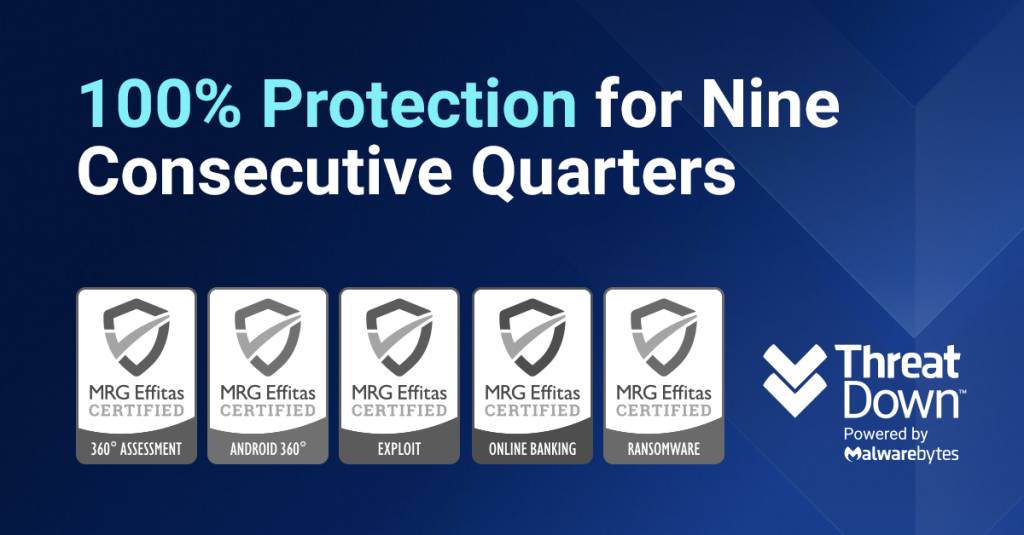
Malwarebytes wins every MRG Effitas award for 2 years in a row
ThreatDown has earned 37/37 awards over nine consecutive quarters.
ThreatDown Endpoint Protection (EP) achieved the highest possible score (100%) and received certifications for Level 1, Exploit, Online Banking, and Ransomware in the most recent anti-malware efficacy assessment results for the Q3 2023 evaluation performed by MRG Effitas, a world leader in independent IT research.
These results mark the ninth time in a row ThreatDown has received all certification awards, and is now officially the only vendor to win every single certification and award from Q3 2021 through Q3 2023.

MRG Effitas assesses a product’s ability to meet today’s most pressing threats in-the-wild, such as stopping zero-day malware, ransomware, and exploits—and doing so with speedy performance and low false positives.
After unveiling their new phishing assessment in Q2 2023, MRG Effitas in Q3 2023 began awarding a full-on 360° Phishing Certification to vendors who could take down phishing threats.
ThreatDown blocked 100% of phishing attempts in the In-the-Wild (ITW) Phishing Test. In other words, ThreatDown is the only vendor to consistently receive all 4 award logos and block 100% of phishing attempts.
How we were able to do it: The signature and behavior-based detection techniques and proprietary anti-exploit technology of ThreatDown EP allowed it to detect and autoblock more malware than any other competitor on the Q3 test. In addition, the Web protection layer of our EP blocks access to and from known or suspicious Internet addresses, allowing us to ace the phishing tests.
As an integral foundation layer for ThreatDown Bundles, these results prove that ThreatDown provides reliable and comprehensive protection against a wide range of threats.
Let’s dive into where we prevented more than the rest and how we were able to do it.
100% of phishing attempts blocked
Given the frequency and risks associated with phishing attacks today, it’s clear that modern endpoint security needs to protect against these attacks.
According to Verizon, attackers used phishing for initial access in 15% of data breaches in 2022. CISA also showed that, within the first 10 minutes of receiving a phishing email, 84% of employees took the bait. After successfully compromising a system through phishing, threat actors can further their attacks by dropping ransomware or stealing sensitive data, leading to costly financial and reputational damages.
ThreatDown blocked 100% of phishing attempts in the ITW Phishing Test and was only one of two vendors to score 80% or above in the Phishing Simulator Test.
How we were able to do it: ThreatDown EP, the foundation for ThreatDown Bundles, features a Web protection layer that blocks access to and from known or suspicious Internet addresses.
100% of ransomware blocked
Using a blend of signature and signature-less technologies, the anti-ransomware layer of ThreatDown EP constantly monitors endpoint systems and automatically kills processes associated with ransomware activity.
MRG Effitas tested security products against 65 ransomware samples. In addition, they tested four ransomware simulator samples created in-house, ensuring the security product could only rely on its behavior scanning modules. To test for false positives, a device running ThreatDown EP also ran three benign programs designed to mimic ransomware behavior.
ThreatDown blocked 100 percent of ransomware threats in the MRG Effitas assessment and did so with no false positives, allowing the three benign programs to run. For this we earned the 360° Ransomware Certification.
100% of banking malware blocked
In 2021, 37% of banking malware attacks targeted corporate users.
We were one of the few vendors who earned a 360° Online Banking Certification, which means ThreatDown EP stopped 100% of threats designed to steal financial information and money from victim’s accounts. To outperform the others, our unique detection technology again came into play.
ThreatDown EP blocked 100% of the 16 financial malware samples, the Magecart credit card-skimming attack, and Botnets designed to steal credentials.
100% of zero-day threats blocked
One of the many strong suits of our detection is that it can detect malware that has never been seen before, also called zero-day malware. Again, we were one of the only vendors to detect and block these pernicious threats, which account for 80% of successful breaches.
Built on machine learning (ML) and behavioral analysis techniques, our behavior-based detection enabled ThreatDown EP to detect and block 100% of all zero-day threats. For this, as well as blocking all Botnets, we earned the 360° Level 1 Certification.
100% of exploits blocked
The anti-exploit feature of ThreatDown EP protects organizations from one of the most advanced cyber attacks: zero-day exploits targeting browser and application vulnerabilities.
But don’t take our word for it: MRG Effitas used 8 different exploitation techniques to try and deliver a malicious payload on a device running ThreatDown EP—but they didn’t get very far. Malwarebytes earned the 360° Exploit Certification for autoblocking 100% of Exploit/Fileless attacks, entirely protecting the system from infection.
We were one of the few to earn the 360° Exploit Certification all thanks to our proprietary anti-exploit technology, which wraps vulnerable programs in four defensive layers that prevent an exploit from installing its payload, or even executing initial shellcode.
Consistency is key
If there is one shining take away from this accomplishment, it’s that consistency is key.
You don’t want a security solution that passes rigorous tests like MRG Effitas only some of the time. You want a solution that passes them with flying colors all of the time. Clearly, ThreatDown EP, and by extension our ThreatDown Bundles, is that solution.
For organizations that are concerned their current solution may not be up-to-par, the MRG Effitas assessment has demonstrated that ThreatDown—more consistently than anybody else—has what it takes to keep your business safe from today’s most pressing cyberthreats.



